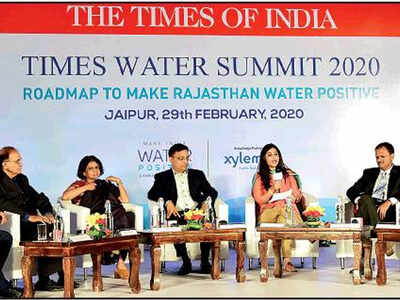
JAIPUR: Necessity is the mother of innovations, a secret behind the desert state’s pioneering models for water conservation that it gave to the country in the past. But can Rajasthan do it one more time when the situation demands the most? Renowned experts and senior government officials during a panel discussion on ‘Making Rajasthan Water Positive’ did hold out hope that the critical situation can be turned around but it needs a circular approach of community participation, technology adoption and government policy intervention.
Opening the conversation, Naveen Mahajan, secretary, water resources department, set the context by saying Rajasthan depends heavily on neighboring states like Punjab, Madhya Pradesh and Gujarat as it gets 52% of its surface water from them though rivers like Ravi, Beas & Satluj, Chambal and Narmada. But Mahajan raised the red flag as to what will happen if those states violate the inter-state water sharing agreements in case of scarcity.
“Water being a very political topic, no state is willing to cede its share to the neighboring state. Unfortunately, we are downstream state, at the tail-end. If there is water scarcity in the upstream states, things will be very tough. The major challenge of water security for us is to ensure that our supplies are guaranteed as per the agreements,” said Mahajan.
He listed out the priorities of the government and said it’s high time we went for drips sprinklers. “Whatever new projects will come, now they will be purely on pressure pipe micro irrigation system,” added Mahajan.
Ajitabh Sharma, principal secretary, energy department, who also served as secretary of water resources department in the past, said it would be difficult to achieve sustainability by following a linear approach.
“Technology, engineering, projects, implementation, and bringing in large capital will not lead to sustainability if the community is not involved. Water is not scarce, there is plenty of it. It all depends how you use it. We have to start thinking beyond the engineering prospective. So, it has be a circular economy. We have to treat the water, have treatment standards for different uses which is not there now. In India, we have not started thinking about nature-based solutions for treatment of water, and we have to understand the aquifers for their recharge,” said Sharma.
But answering directly the question of making Rajasthan water positive, director of Central Ground Water Board S K Jain said Rajasthan has ground water which can be replenished up to 12 bcm (billion cubic metre) but we withdraw 17 bcm annually.
“To make it water positive, we need 5 bcm more. Storage of water, creating recharge structures, targeting Chambal basins, recycling and using less water and managing the water used in the agriculture sector will be the key to meet the shortfall and make Rajasthan water positive, Jain added.
Environmentalist and director general of Centre for Science and Environment Sunita Narain dwelt on the immediate dangers of climate change and the urgency to take sustainability seriously.
“We will have to catch up very fast because with climate change you have no time now to waste. Climate change is going to mean that we will have more rain in fewer number of rainy days and India already gets rain only for 100 hours on an average. Now, because of climate change the hours will come down and the rains will increase. This means we will have floods and droughts and it will not be like the traditional droughts or floods. It will be devastating,” warned Narain.
Agreeing with the remarks made by Jain, Ashok Sethi, chairman of Tata Consulting Engineers, said to avoid a situation like Punjab, we need to have better planning to avoid severe water crisis. “It is not the job of just agriculture department or water resource department to think about conserving water. We need to think about water as a model of economic growth, and take this issue seriously,” said Sethi.
Director of NJS Engineering India Pvt Ltd Sanjay Guleria said there have been ancient techniques through which we conserve water but to recycle it we need public participation. “It is not the work of just the government alone but people have to come forward to participate in it. They are still hesitant to use the recycled water and for that, more awareness needs to be created,” said Guleria.
H. Balasubramaniam, managing director, Xylem Water Solutions India Pvt Ltd, who gave a presentation on water crisis and management earlier in the summit said Rajasthan has been able to improve its parameters but needs to take more steps to make it sustainable. Balasubramaniam said, “Rather than building new projects, we have to take maximum advantage of the existing ones. The second thing we tell the state governments is that they do not go for immediate high capex projects. On the other hand, I think the problem of water needs to be taken to the roots. Can the government make a policy and enforce it strictly to ensure that a hotel, for an example, recycles the water it uses so that it does not load the burden on the public.”
Opening the conversation, Naveen Mahajan, secretary, water resources department, set the context by saying Rajasthan depends heavily on neighboring states like Punjab, Madhya Pradesh and Gujarat as it gets 52% of its surface water from them though rivers like Ravi, Beas & Satluj, Chambal and Narmada. But Mahajan raised the red flag as to what will happen if those states violate the inter-state water sharing agreements in case of scarcity.
“Water being a very political topic, no state is willing to cede its share to the neighboring state. Unfortunately, we are downstream state, at the tail-end. If there is water scarcity in the upstream states, things will be very tough. The major challenge of water security for us is to ensure that our supplies are guaranteed as per the agreements,” said Mahajan.
He listed out the priorities of the government and said it’s high time we went for drips sprinklers. “Whatever new projects will come, now they will be purely on pressure pipe micro irrigation system,” added Mahajan.
Ajitabh Sharma, principal secretary, energy department, who also served as secretary of water resources department in the past, said it would be difficult to achieve sustainability by following a linear approach.
“Technology, engineering, projects, implementation, and bringing in large capital will not lead to sustainability if the community is not involved. Water is not scarce, there is plenty of it. It all depends how you use it. We have to start thinking beyond the engineering prospective. So, it has be a circular economy. We have to treat the water, have treatment standards for different uses which is not there now. In India, we have not started thinking about nature-based solutions for treatment of water, and we have to understand the aquifers for their recharge,” said Sharma.
But answering directly the question of making Rajasthan water positive, director of Central Ground Water Board S K Jain said Rajasthan has ground water which can be replenished up to 12 bcm (billion cubic metre) but we withdraw 17 bcm annually.
“To make it water positive, we need 5 bcm more. Storage of water, creating recharge structures, targeting Chambal basins, recycling and using less water and managing the water used in the agriculture sector will be the key to meet the shortfall and make Rajasthan water positive, Jain added.
Environmentalist and director general of Centre for Science and Environment Sunita Narain dwelt on the immediate dangers of climate change and the urgency to take sustainability seriously.
“We will have to catch up very fast because with climate change you have no time now to waste. Climate change is going to mean that we will have more rain in fewer number of rainy days and India already gets rain only for 100 hours on an average. Now, because of climate change the hours will come down and the rains will increase. This means we will have floods and droughts and it will not be like the traditional droughts or floods. It will be devastating,” warned Narain.
Agreeing with the remarks made by Jain, Ashok Sethi, chairman of Tata Consulting Engineers, said to avoid a situation like Punjab, we need to have better planning to avoid severe water crisis. “It is not the job of just agriculture department or water resource department to think about conserving water. We need to think about water as a model of economic growth, and take this issue seriously,” said Sethi.
Director of NJS Engineering India Pvt Ltd Sanjay Guleria said there have been ancient techniques through which we conserve water but to recycle it we need public participation. “It is not the work of just the government alone but people have to come forward to participate in it. They are still hesitant to use the recycled water and for that, more awareness needs to be created,” said Guleria.
H. Balasubramaniam, managing director, Xylem Water Solutions India Pvt Ltd, who gave a presentation on water crisis and management earlier in the summit said Rajasthan has been able to improve its parameters but needs to take more steps to make it sustainable. Balasubramaniam said, “Rather than building new projects, we have to take maximum advantage of the existing ones. The second thing we tell the state governments is that they do not go for immediate high capex projects. On the other hand, I think the problem of water needs to be taken to the roots. Can the government make a policy and enforce it strictly to ensure that a hotel, for an example, recycles the water it uses so that it does not load the burden on the public.”
Get the app









